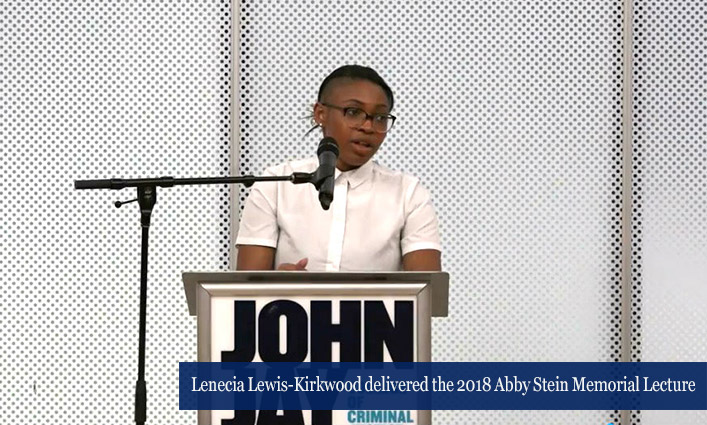
The legacy of beloved Professor Abby Stein was honored at the fourth annual Abby Stein Memorial Lecture this February. Stein, who is remembered as a champion for student success, was also involved in launching the innovative John Jay-Vera Fellows Program. Every year, Vera alumni participate in the Abby Stein Memorial Lecture to discuss how their experience in the intensive program has influenced their careers.
Professor Caroline Reitz, who teaches in the Interdisciplinary Studies Program (ISP) and helps manage the Vera Fellows program, says that the idea to bring Vera graduates back to campus was championed by Abby Stein. Stein embodied John Jay’s mission for justice. “She was fierce,” Reitz says. “She was completely passionate both as a researcher and a classroom teacher.”
This year, alumna Lenecia Lewis-Kirkwood delivered the annual Abby Stein Memorial Lecture. After graduating from John Jay, she received her M.A. from Johns Hopkins and now works at the U.S. Embassy in Cairo, Egypt. In a fascinating Q&A session with students, faculty, and alumni, Lewis-Kirkwood talked about her unique experience as a young diplomat and African-American woman serving in the Muslim world.
Current senior Tialena Elliott also spoke at the event. After a year-long internship placement made possible by the Vera Fellows program, Elliott now works part-time at Common Justice, an alternative to incarceration program. As the inaugural recipient of a new award to help Vera students and alumni study and do research abroad, Elliott recently traveled to Morocco. The trip helped solidify her interest in justice that developed after becoming a Vera Fellow. “Two years ago, ‘social justice’ was just a hashtag,” she said. “But now, because of my internship placement and the work I’ve done with the professors in the program, I know that I want to work in social justice and do prisoner re-entry work.”
Like Elliott, all Vera Fellows are placed in intensive year-long internships at justice organizations. In addition to gaining hands-on experience at their internship sites, students attend weekly seminars by ISP faculty members. Reitz, who teaches the fellowship seminars with Professor Nina Rose Fischer and Professor Alisse Waterston, said that this model benefits all students, whether they choose to continue their education or launch straight into careers after graduating. “Around 50 to 60 percent of our students go on to graduate school or work full time with justice agencies afterwards,” said Reitz.
Stein, who was highly involved at the College, set a powerful example for the students who knew her. After dropping out of high school, Stein eventually returned to school and became the dedicated professor and passionate mentor that she is still remembered as. According to Reitz, Stein often saw herself in John Jay’s students, and was quick to recognize their assets and skills so she could help mold them into leaders.
That mission of helping students become leaders continues with the Vera Fellows Program, and would undoubtedly make Stein proud. “The Vera Fellowship program has taught me to believe in my potential,” said Elliott. “It’s helped me find myself.”




